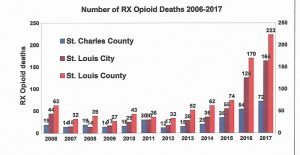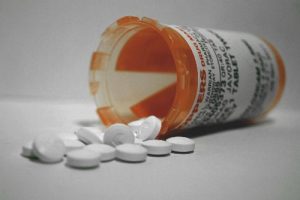 PDMP is a law enforcement tool being sold as Doctor tool.
PDMP is a law enforcement tool being sold as Doctor tool.
Surveillance is the purpose and not just opioid usage. St. Louis County PDMP killed more people than ever before and they don’t tell you, see chart. Citizens should note this day in history, When a slim majority of Republicans, made up of House leadership who owe the Health care lobby political favors and freshman who have no institutional knowledge on the issues of this bill, voted with the Democrats to seize your private health information as well as details that identify you personally, which are coveted by hackers for identity theft, medicare and medicaid fraud and blackmail. Not surprisingly, no amendments were allowed that the bill sponsor admitted would make the bill better.. The most notable would have required the Doctors and Pharmacists to actually use the database prior to prescribing or dispensing opioids. Every claim that the proponents spout as the need for the database are
,for all practical purposes negated without 100% participation. It is counter intuitive for the health care lobby to require the bill sponsor to withdraw the bill if required to use the database. Perhaps the Doctors know that the opponent claims are true. The Health care lobby are talking out of both sides of their mouth. Kill the bill if made mandatory, support it if not. All best practices say that it has to be mandatory. So what is really up? Put your thinking caps on folks. Forty-nine states have PDMP and no state has experienced a sustained decrease, in fact no state is lower today than before they implemented PDMP. The sponsor of the bill touts a study that a newly implemented robust PDMP reduces opioid related deaths by 1.12 deaths per 100,000 people. The study evaluated data from 1999 to 2013 comparing 32 states that implemented PDMP during that time period and the two remaining states that had not, Missouri and New Hampshire. What she didn’t say is they had to throw out West Virginia data in order to make that claim. Fast forward to 2017 with 4 more years of data available. New Hampshire implemented a robust PDMP in 2014, in 2013 the year of the study their opioid related death rate was 7.1 deaths per 100,000. CDC data shows that the year it implemented 2014, their opioid related death rate jumped to 17.5 and as of 2017 a whopping 30.9 opioid related deaths per 100,000 population. You don’t have to believe me read New Hampshire’s scathing
audit report of 2017 or this news summary. This study was so fatally flawed it begs the question, Why was a federal grant used ? Was it to put pressure on Missouri? One co-author is an Associate Professor at Vanderbilt University located in Tennessee and another is an official of Tennessee Dept. of Health who used Federal funds for the study and then sited the study to apply for additional federal PDMP Funding. By the way, Tennessee’s death rate was 9.9 in 2013, 2017 death rate 16.1. You tell me sounds like the fix is in. The Feds are desperate to complete the nationwide database network that contains drugs not just associated with the opioid epidemic, but drugs such as anti-anxiety, and anti-depressants some which are considered mental health drugs. Put your thinking caps on and ask why track those? Watch for follow up articles as this bill enters the state senate. If you think that PDMP is not good for Missouri, contact you state senator by going to https://www.senate.mo.gov/LegisLookup/Default.aspx
 LINK
LINK